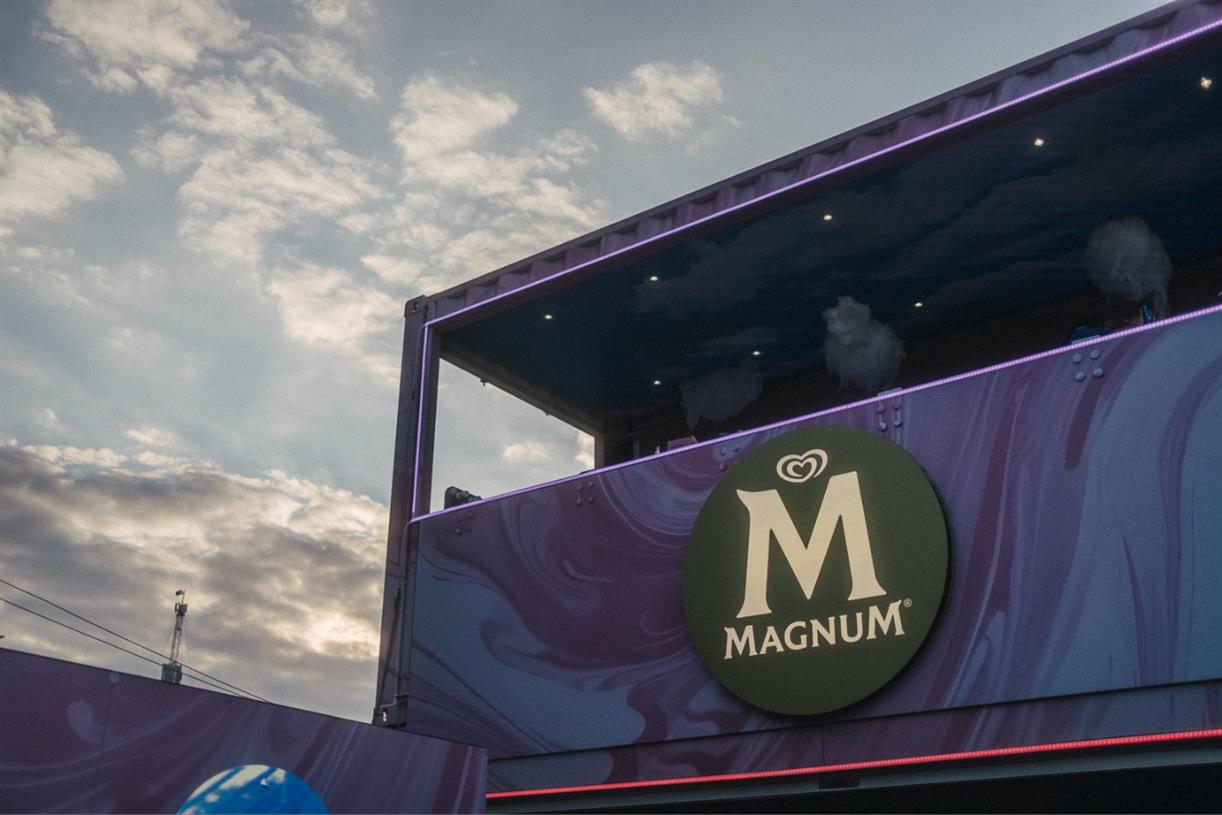How Celsius energy drink is challenging Monster and Red Bull—and winning
Smart positioning and a savvy e-commerce approach put the calorie-burning beverage on the map in the highly competitive energy drink sector.

This is the first installment of “Brands on the rise,” a regular Ad Age feature spotlighting the marketing and business tactics of successful challenger brands.
When it comes to U.S. energy drinks, there are two heavyweights and everyone else: Monster and Red Bull controlled some 60% U.S. retail dollar market share in 2021, with no other brand reaching double-digit share, according to Beverage Digest.
But there is one challenger brand rocketing up the sales chart: Celsius, which grew dollar sales by 188% last year. The Boca Raton, Florida-based brand has broken through with drinks it markets as clinically proven to accelerate metabolism and burn calories and fat. It uses a gender-neutral marketing approach targeting health-conscious consumers that stands apart in the often ego-driven, extreme-sports-laden sector that has historically marketed to men.
While Celsius still only has less than a 2% share in the $16 billion U.S. energy drink category, it is making marketing and distribution moves that are turning heads—including winning big on Amazon.
Celsius is “constantly trying to push the envelope,” said CEO Jon Fieldly. “We are always going to be outspent—how do we out-maneuver and out-execute? It’s the only way we are going to win going against two of the largest CPG brands in the world, Red Bull and Monster, in an extremely competitive category.”
Below, more on where Celsius came from, where it’s headed—and some secrets to its marketing success that all brands can learn from:
How it started
Celsius was founded in 2004 in Delray Beach, Florida and run by husband-and-wife team Steve and Janice Haley. The drink was positioned as a first-of-its-kind “calorie-burning beverage” designed to increase metabolism. A key moment came about three years later when it drew a major investment from South Florida entrepreneur Carl DeSantis, who is known for selling his vitamin firm Rexall Sundown for $1.8 billion in 2000. The category-busting drink benefited early on from free media coverage on newscasts and on NBC’s “Today Show,” according to media reports.
But the early momentum fizzled by 2011 after the company burned through $19 million in investment money and lost a big distribution deal with Costco, according to a 2016 profile in the Sun-Sentinel. "That was what I was greeted with immediately – that 40 percent of our revenue would be going away," Gerry David, who was named CEO in 2011, told the newspaper.
David, a former executive at biotech company Oragenics, moved the drink beyond its health club roots, seeking a broader audience of health-conscious adults, according to the Sun-Sentinel.
But it was the brand’s presence at a health club that resulted in a key break: An associate of Chinese billionaire Li Ka-Shing spotted Celsius at an Equinox in Los Angeles and took it back to Ka-Shing in Hong Kong, recalled Fieldly, who was named CEO in 2018 after serving as chief financial officer since 2012. Ka-Shing “started drinking our cola flavor and just fell in love with it,” Fieldly told Ad Age, noting the billionaire had one before every round of golf. In 2015, Celsius lured a $15.9 million investment from a group that included Ka-Shing’s Horizons Ventures and hip hop mogul Russell Simmons.
Horizons—known for early investments in companies like Facebook and Zoom—“saw us as a disruptive technology ... and that is how we got talking,” Fieldly said. “A lot of business is about being at the right place at the right time, but you’ve got to be ready to capture it.”
Subscribe to Ad Age now for the latest industry news and analysis.
Marketing strategies
As Celsius looked to reclaim distribution, it stayed close to its Florida roots, targeting Miami and Tampa, and added on three cities that had a high concentration of health clubs: Dallas, Los Angeles and San Diego. “Our marketing strategy has been extremely tight. We had a drill deep strategy of five initial markets,” Fieldly said.
The brand, which uses the tagline “Live Fit,” targets people where they live, work and play, setting up distribution and marketing that hits its key target of health-conscious consumers ages 24 to 44 multiple times a day. Its media plan includes digital TV to reach consumers at home; digital radio to catch them on their way to work; and then marketing at running races or near beaches to capture “play” occasions. Experiential marketing has included a “Live Fit tour” featuring branded pop-up fitness events hosted by popular instructors from nationwide fitness chains.
Celsius is now sold nationally, as well as in some international markets, at more than 150,000 retailers, including key accounts with Publix, Target, CVS, Walmart and Kroger.
Tipping point
Celsius’ sales began taking off after it got into 7-Eleven, a key convenience outlet for on-the-go energy drink consumers. But it took plenty of persistence. The brand lobbied regional 7-Eleven managers but “we got a lot of no’s,” Fieldly said. Finally, “we were able to crack some store owners that were willing to go against corporate.” Then, after strong sales, “we got noticed by corporate and we were finally able to get a meeting with them,” he said.
7-Eleven “saw Celsius as an opportunity to be able to capitalize on the health and wellness trend,” he added. One key factor: Celsius had appeal with both men and women, a differentiator from other energy drinks that skewed male.
Key e-commerce decision
In 2014, Celsius made a decision that would pay major dividends years later: It stopped selling direct-to-consumer, including getting rid of a website where it took orders. “I know that might frustrate a lot of marketers because you are losing that connection with consumers,” Fieldly said. But “we wanted to be able to be a supplier that services retailers” and “do what we do best: we are sales and marketing,” he said. “All of the grocery stores were moving into the digital age and we wanted to be on the forefront to partner with them to build out their systems.”
Today, Celsius says it ranks as the No. 2 energy drink seller on Amazon, behind Red Bull.
Influencers, celebs and TikTok
Celsius creates most of its marketing content in-house. One of its secret weapons is its brand ambassador program. Anyone can apply directly on the brand’s website. Applicants are vetted for enthusiasm, social media skills and other attributes. The brand now counts 1,500 ambassadors who range from influencers with strong social followings to popular fitness instructors. They are asked to attend trade shows and other events. Compensation includes free product and swag, with some rising to the level of paid employees. “It’s really a recruiting vehicle, to be honest,” Fieldly said. One of its biggest celebrity backers is Olympic snowboarder Shaun White, who inked a deal with the brand just before the Beijing Games.
Other endorsers include New York Knick Julius Randle, who announced his deal last year.
But one of the brand’s biggest celebrity boosts came free of charge: Actor and director Jonah Hill raved about it in a 2021 interview with GQ magazine for a feature called “10 Things Jonah Hill Can't Live Without.” He referred to it as “a health food Red Bull” and boasted that while filming “Don’t Look Up” he converted Leonardo DiCaprio, Jennifer Lawrence, Meryl Streep and Mark Rylance into Celsius addicts.
On TikTok, where Celsius has 783,000 followers, the brand has found the most success simply sharing behind-the-scenes videos of its offices.
What experts say
Duane Stanford, editor and publisher of Beverage Digest, credits Celsius with pioneering the “performance energy” category, “which is not so much anymore about motorcycles and skiing and extreme sports but more about everyday fitness consumers.”
“They started marketing to this particular consumer and they’ve gained traction,” he added, citing the brand’s gender-neutral approach as a key factor. “From the packaging to the marketing to the brand position, they clearly made a concerted effort to appeal to women in a way that energy drinks previously hadn’t.”
Mark Gallo, a beverage trend expert and sales manager at Nor-Cal Beverage Co., a contract beverage manufacturer, said Celsius has thrived on becoming the “cleaner, better-for-you version of Red Bull.”
“Where Red Bull went out with extreme athletes and building their own event marketing stuff, Celsius has come on the heels of this influencer, creative-led social dynamic and truly used micro to larger influencers to help spread the brand,” he said.
What’s next
While Celsius grew up and gained traction by touting its functional beverage credentials with health-conscious 24-to-44-year-olds, it has been edging more recently into the lifestyle space as it seeks to captivate younger drinkers. In 2019 it began introducing a “Vibe” line of flavors targeting Gen Z, with flavors including Peach Vibe and Tropical Vibe.
“The greatest opportunity now we see is this 18-to-24 male [and] female, going after colleges and universities and bringing a consumer in for a longer lifespan,” Fieldly said.
This summer it is running an “Essential Vibes Tour” with events targeting a nationwide slate of music festivals, starting April 16 in Southern California. It is sponsoring the Revolve Festival in La Quinta, California, which is held during the same time as the nearby Coachella Valley Music and Arts Festival. Revolve Festival, run by the Revolve fashion brand, is known for featuring bohemian styles and new musicians.
Celsius is also experimenting with energy bars, which Fieldly said are selling well in Finland. “We are testing it here in the U.S. but it is a very small business,” he said. “We are selling them online and trying to get some consumer data.”
Asked if Celsius would ever be acquired by one of the bigger energy drink brands, he said, “If it happens it happens,” before adding: “We are looking to be the number one energy drink in the world, so maybe we buy them.”
Don’t miss the latest news. Sign up for Ad Age newsletters here.

 ShanonG
ShanonG 
































